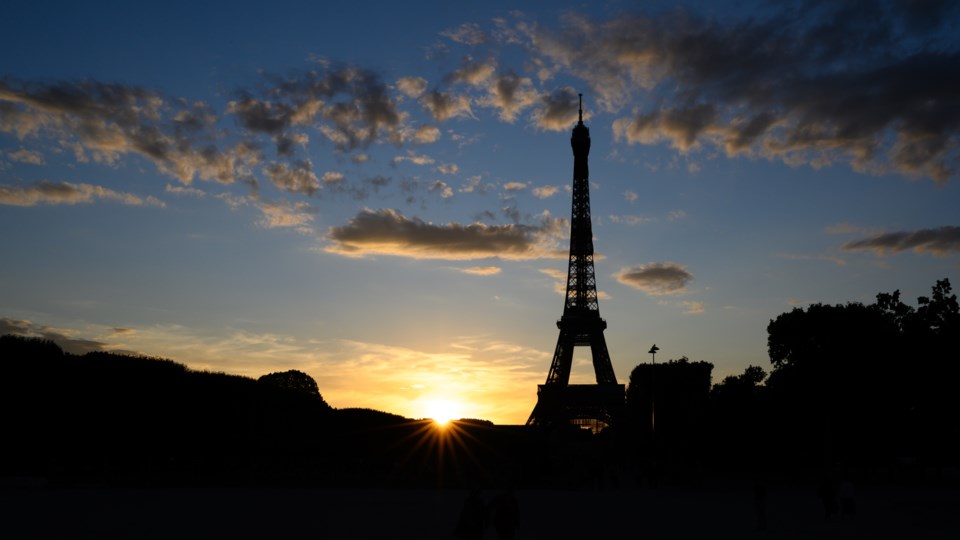My pal who used to run Whistler’s print shop turned off all her lights for an hour. I picked up garbage blowing around the streets and chose vegetarian pizza.
It’s hard to say how many people marked Earth Day this year. Besides the Resort Municipality of Whistler’s annual Earth Day clean-up, do you know anyone who actually did anything Earth-ish April 22?
Even the traditional Earth Hour barely registered. For years, it was an easy-but-potent gesture of “lights out” from 8:30 to 9:30 p.m. that started in Sydney, Australia, and once scored big time around the world.
Sure, the Eiffel Tower still went dark for an hour this year, but was anyone in a restaurant and the lights went off so you only had candlelight to dine by? We used to enjoy that simple gesture, which harkened back to gentler, more innocent—some might say, more deluded—times, when all seemed well and we thought we could do anything without a reckoning.
In 2008, the first year Earth Hour went international, British Columbians were great! In one tiny hour, we saved some two per cent of the overall provincial power load—the equivalent of some 2.8 million lights out. By 2014, that figure dropped by about half. Still, Whistler led the way for Earth Hour that year, with a six-per-cent power reduction. Nice.
But all that was long ago and, oh, how things do change.
In 2018, after years of declining declining-power-use for Earth Hour, BC Hydro noted that we British Columbians, who often like to colour ourselves “green,” actually used more power during Earth Hour! The reversal also spurred Hydro to write a report. Bottom line: most British Columbians still thought Earth Hour is important, despite years of declining participation. We just do bugger all about it.
By 2019, Earth Hour participation was so low, BC Hydro stopped tracking it, period. And isn’t that the way of it these days when it comes to environmental action?
There’s a strange and bewildering irony afoot: Just as we gain more and more awareness and science-based confirmation that we’re all in deep doo-doo—biodiversity fading; species extinctions higher than ever; record-shattering temperatures; drought and storm systems that blow huge swaths of everything right off the map and uproot millions of climate refugees—it seems most of us simply twinkle our toes, fan our brows and go shopping. Literally.
Not trying to shame or scare anyone here, but let’s think for a minute... Know anyone who even considered buying carbon offsets for the last flight they took?
To that end, some people, mostly young people, but far too few people are now desperately, wisely, cheekily looking for ways to get people’s attention to do something, anything, deep and urgent and meaningful to turn the ship around.
The Utopia Bureau—created by Benrik, two authors and former ad guys, Ben Carey, and Henrik Delehag, who collaborate with the likes of Extinction Rebellion and Climate 2025—pairs up climate scientists with comedians to try and break through to us. “That’s the sad truth of our times and that’s the human truth. We listen to jokes more than we listen to lectures,” Carey told the CBC.
Here’s comedian Mark Maron: “On a deeper level, the reason we’re not more upset about the world ending environmentally is I think, you know, all of us in our hearts really know that we did everything we could … I mean, think about it. We brought our own bags to the supermarket.”
Are you laughing?
If that doesn’t grab you, maybe the Slutty Vegan will. This burger chain, make that vegan burger chain, was started in Atlanta by Pinky Cole, one smart, entrepreneurial woman, who, according to The New Yorker, once bought McChickens for a buck then sold them for two to her high school classmates. Here’s the trick today: Customers are mostly meat-eaters, and they literally line up under a sign proclaiming “EAT PLANTS YA SLUT” while a DJ cranks out Drake and more at ear-splitting decibels.
The smart, sassy company putting “pizzazz” and “party” into plant-based eating by acknowledging that sex sells juxtaposes the seeming restraint of veganism with the “I’ll do what I want” attitude of sluttery. Now valued at US$100 million, Slutty Vegan is expanding (wouldn’t it be perfect for Whistler?), with multiple outlets offering no-meat burgers like the Fussy Hussy (with caramelized onions and vegan cheese) and Ménage à Trois (with vegan bacon and vegan shrimp). People who never thought they would be are gobbling up vegan fare and lovin’ it.
Meanwhile, over on the baseball diamond, some fans are excited that a study proving batters are hitting more home runs due to the warmer, thinner air caused by global warming might open up some eyes to the climate crisis than otherwise would be.
The study, done by researchers at Dartmouth College, tracked 100,000 games and 220,000 batted balls over decades, and found that more than 500 home runs since 2010 were attributable to climate change. On average, a 1 C-increase in air temperature means a two-per-cent increase in home runs per game.
While the climate crisis is affecting all kinds of sports—and way more in more dramatic ways—one climate scientist believes that since the study proves how pervasive the impacts are, maybe some baseball fans who otherwise would never give the climate crisis a second thought might now sit up and take notice. Ya never know.
Like they say in the environmental movement, Extinction Rebellion: Tell the truth. Act now. Go beyond politics. And don’t forget to apply some wit and sassy humour, and your best baseball stats, to effect real change.
Glenda Bartosh is an award-winning journalist who couldn’t believe how hollowed out Earth Day was this year.




